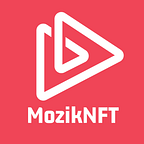How Blockchain Startup Mozik is Revolutionizing the Music Industry with NFT’s
The music industry has been transformed dramatically over the past few decades as the Internet has changed the way we create and consume music. New standards have emerged that take control away from leading labels and give it to the people.
This shift isn’t unique to the music industry either; almost everywhere a commercial exchange between buyer and seller occurs, has been revolutionized during the digital age. Imagine how now, a newly-opened cafeteria has access to tools such as TripAdvisor or Yelp! that provide consumers with the power to rate and review the business.
With this newfound power, the music industry is in need of balance. These changes are responsible for the rise and fall of musicians, record labels, and enterprises. Musicians have suddenly recognized that freedom from enterprise comes with the challenging task of self-promotion and innovation to thrive.
Consumers have now found new ways to consume music without the need for a media-curated filter or advertisements backed by big firms. In turn, musicians need to understand and learn how to become their own bosses to compete for these “spots” themselves.
Music Industry Pain Points
1. The Majority of Artists Make Very Little Money
The majority of music artists are willing to play the long game, believing it will ultimately pay off. Unfortunately for those looking to build a career by releasing original music, it is not a guarantee that things will develop financially.
Music is everywhere and consumed more effortlessly than ever before. With this, there are a growing number of new opportunities and prospects for musicians every day. Everything grows fast in the music industry.
So why are musicians struggling to make money from it? If the Internet is the revolution it is portrayed as being, why aren’t artists profiting from these changes?
A recent study by Citigroup stated that artists only gained 12% of the $43 billion generated through the music industry in 2017. The stats prove that while the overall industry is still profitable, its main actors, the music artists who contribute their talent, are left without.
This fact is restated by the stats of how much profit music artists make on the biggest music streaming platform — Spotify. The company pays rights-holders between $0.006 and $0.0084. per play. To earn $1000 every month, an artist needs to be listened to at least 120,000 times. Moreover, this applies only if the artist is the only rights holder of the track, which is rarely the case.
2. Long-Term Deals are now a Relic of the Past.
Previously, up-and-coming musicians had far more time to grow, experiment, and even experience failure before getting a break. A record label would sign a few releases, and during that time, the artist had the opportunity to mature. At present, the music industry demands a finished track.
Additionally, because money wasn’t as big a problem back then for music, music studios and labels sometimes bet on outsiders and innovators. That’s how we’ve come to know people like Frank Zappa.
3. Industry Monopolies and Paid Promotions
Just like what happens in any market dominated by a small number of key players, the music industry remains a difficult sector to get into as an “outsider.”
The Internet has democratized entry and distribution to the masses as illustrated by the rise in popularity of SoundCloud rappers and runaway streaming hits. Despite this, however, gaining popularity and success still remains very much a thing of luck, opportunity, and extraordinary marketing.
How Will NFT’s Disrupt the Music Industry?
NFT’s are stored on the blockchain similar to cryptocurrencies such as Bitcoin and Ethereum. NFT’s are unique, however, in the way that two digital objects may never be identical. An NFT can consist of images, music, art pieces, GIFs, and even physical items.
Before COVID, the majority of music artists gain profits from touring, ticket sales, and merchandise. Now, NFTs are being considered a means of bridging this gap in income. For example, pop musician and visual artist Grimes sold a series of digital art NFT’s. Her digital art collection sold for a total of $6 million.
NFT’s have the potential to entirely change the way the music industry works, giving the power into the hands of the creative artists who drive the industry. This will allow artists to directly showcase their work on the blockchain, eliminating the need for expensive marketing.
Artists have the potential to provide exclusive music videos, behind-the-scenes information, and album art. Moreover, they can always release their albums as NFT albums.
Mozik, a Music NFT platform
Mozik is a decentralized music NFT platform aiming to build a healthier and fairer music ecosystem.
Through the decentralized NFT platform, Mozik adopts blockchain technology to register earnings through music copyright, super-star IP, celebrity traffic, and IP derivatives on chain. All the participants in the music ecosystem, including creators, publishers, customers, and fans can fairly participate. Through Mozik’s platform, artists will be incentivized to create more and better quality music. With lowered publishing cost and higher engagement from music fans, all participants can share in the rewards, and create a healthier and fairer music ecosystem.
As the music industry continues to be dependent on streaming services and other forms of revenue generation, it is only fair that artists should be profiting too.
